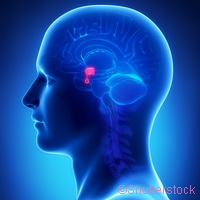Potential new treatment for Cushing's syndrome
New treatments to combat Cushing's syndrome could be on the horizon thanks to a discovery by an international team of researchers. They successfully reprogrammed the identity of cells in the pituitary gland and identified critical mechanisms of epigenetic cell programming. The team believes that an outcome of this discovery could eventually lead to new pharmacological targets for the treatment of Cushing's syndrome. Their results have been published in the scientific journal Genes & Development. It is estimated that Cushing's syndrome affects approximately 0.9 in 10,000 people in the European Union (EU). This disease is characterised by an excess of the hormone cortisol in the blood and is caused by small tumours of the pituitary gland that produce excessive amounts of hormones. For patients with this disease, the abnormal hormone production can lead to hypertension, obesity, diabetes and osteoporosis. Patients with Cushing's syndrome suffer from weight gain affecting the face and torso (but not the limbs), growth of fat above the collarbone and the back of the neck, easy bruising, excessive growth of coarse hair on the face, weakening of the muscles and bones, depression, diabetes and high blood pressure. Cushing's syndrome is a severe disease that is long lasting and may be life threatening because of its complications, which include diabetes, high blood pressure and psychological disturbances. 'For approximately 10 % of patients suffering from Cushing's disease, we found that the disease-causing tumours contain cells that express the Pax7 protein,' explains Dr Drouin, director of the Molecular Genetics research unit at the Institut de recherches cliniques de Montréal (IRCM). He explains: 'No effective pharmacological treatment currently exists for Cushing's disease. This discovery could ultimately lead to the development of such treatment, based on tumour growth inhibition by hormones, similarly to what is already done for other pituitary tumours like lactotrope adenomas.' The team, led by Dr Drouin, studied the pituitary gland referred to as the master gland; it is located at the base of the skull, where it secretes hormones to control all other glands of the endocrine system. Any disruption of pituitary functions can have dire consequences on growth, reproduction and metabolism. Within the pituitary gland, each hormone is produced by cells of a different lineage. Unique cell identities are created by cell-specific genetic programs that are implemented during development. Appropriate cell programming is a critical process that needs to be harnessed in order to exploit the therapeutic benefits of stem cell research. In their work, the researchers showed that the transcription factor Pax7 has pioneering abilities, meaning that it is able to open the tightly packed chromatin structure of specific regions of the genome. This unmasking of a subset of the genome's regulatory sequences changes the genome's response to differentiation signals so that different cell types are generated. 'We reprogrammed the identity of pituitary cells by using the Pax7 gene in order to create two different types of cells,' says Lionel Budry, former student in Dr Drouin's laboratory and first author of the article. 'This allowed us to show that the Tpit protein produces different cell lineages according to the presence or absence of Pax7, and its impact on chromatin organisation.' The researcher group included scientists from IRCM who worked in collaboration with colleagues from Université de la Méditerranée and Hopital La Timone, Marseille in France and Utrecht University in the Netherlands.For more information, please visit: Institut de recherches cliniques de Montréalhttp://www.ircm.qc.ca/ Université de la Méditerranéehttp://www.univmed.fr/
Countries
Canada



